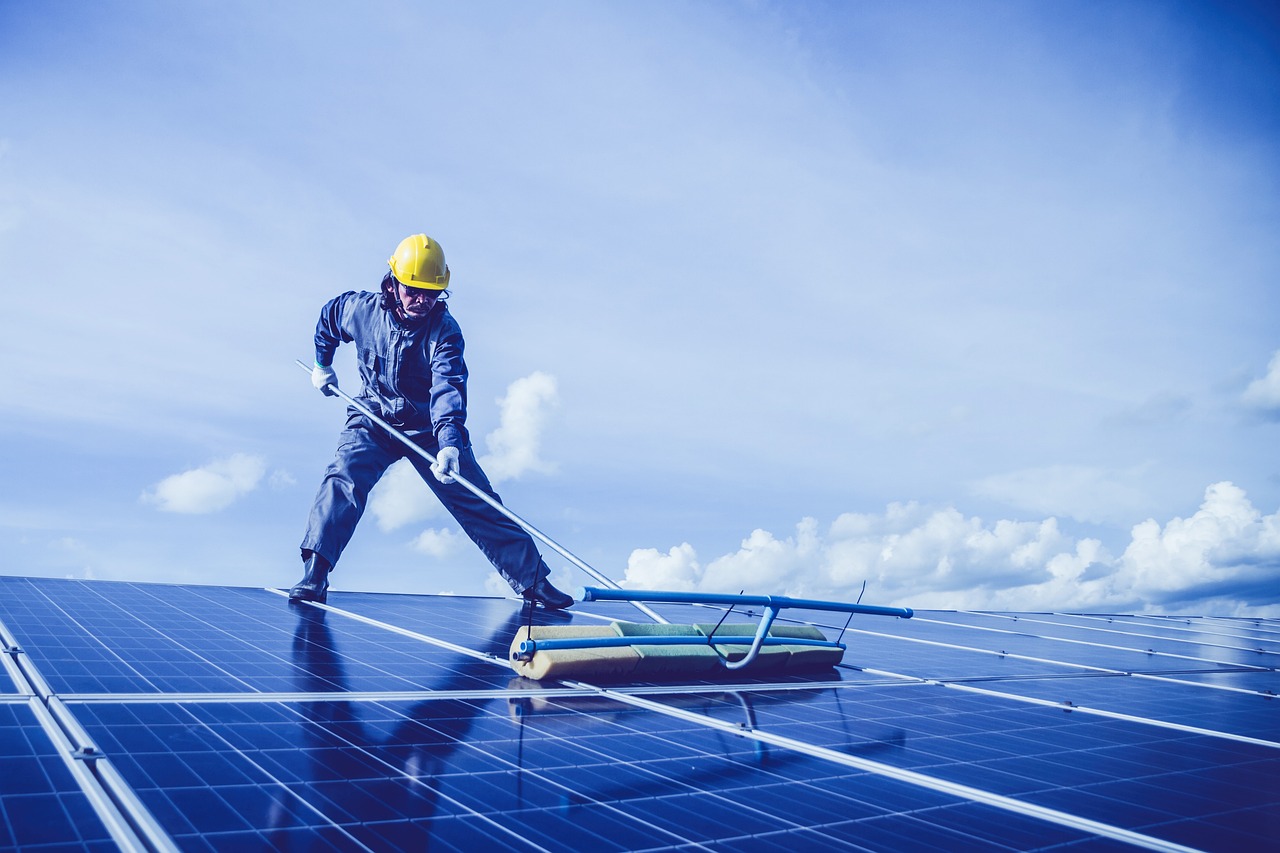
Solar Panel Maintenance: How to Keep Your System Running Efficiently
Solar panels are an excellent investment for homeowners and businesses looking to reduce energy costs, minimize their carbon footprint, and move toward energy independence. However, like any long-term asset, regular maintenance is essential to ensure optimal performance and longevity. Maintaining your solar panels can prevent efficiency losses and ensure your system continues to deliver maximum output.
In this comprehensive guide, we will explore everything you need to know about solar panel maintenance, including why it’s important, how to perform routine checks, common issues to watch out for, and tips to maximize your solar system’s efficiency.
1. Why Solar Panel Maintenance Is Important
Solar panels are designed to be low-maintenance and durable, often lasting 25-30 years. However, dirt, debris, weather conditions, and electrical issues can degrade performance over time. Maintaining your solar panels helps to:
- Maximize Efficiency: Regular cleaning and inspections ensure your system generates the maximum possible electricity.
- Extend Lifespan: Proper care reduces wear and tear, ensuring your panels last longer.
- Protect Your Investment: Preventing damage or malfunctions helps avoid costly repairs or replacements.
- Monitor for Performance Drops: Maintenance allows you to spot potential problems before they become serious issues that affect your energy savings.
Even small inefficiencies can add up over time, reducing the financial returns from your investment. By adhering to a maintenance schedule, you can ensure that your solar power system continues to operate at peak performance.
2. Routine Cleaning: The First Step to Optimal Performance
One of the most common reasons for a drop in solar panel efficiency is dirt and debris. Dust, leaves, bird droppings, pollen, and other particles can accumulate on the surface of your panels, blocking sunlight and reducing energy production.
How Often Should You Clean Your Solar Panels?
Cleaning frequency depends on your location and environment. For example, solar panels in dusty areas, near construction sites, or under trees may need to be cleaned more frequently. As a general rule, it’s recommended to clean your solar panels every 6 to 12 months. If you live in an area with heavy pollution, dust, or frequent rain, more regular cleaning may be necessary.
Steps for Cleaning Solar Panels:
- Check Manufacturer Recommendations: Always refer to your solar panel manufacturer’s instructions for cleaning methods to avoid damaging the panels.
- Use Soft, Non-Abrasive Tools: A soft brush, sponge, or microfiber cloth can be used to gently remove debris without scratching the panels.
- Avoid Harsh Chemicals: Use a mild detergent mixed with water, or simply use plain water. Avoid abrasive cleaners or detergents that may damage the panel surface.
- Clean Early in the Morning or Late in the Evening: Cleaning your panels during cooler hours will prevent water from evaporating too quickly and avoid the risk of thermal shock to the panels.
- Rinse with a Hose: For light cleaning, a garden hose with a gentle spray setting can be sufficient to wash away dirt and debris. Avoid high-pressure washers, which could damage the panels.
Consider Professional Cleaning Services:
For panels installed on hard-to-reach rooftops, or if you’re uncomfortable cleaning them yourself, hiring a professional solar cleaning service is a good option. These services use specialized equipment to safely and effectively clean solar panels without causing damage.
3. Regular Inspections: Identifying and Fixing Issues
While solar panels require minimal ongoing maintenance, it’s important to regularly inspect your system for any potential issues. Conducting inspections will help identify problems early and ensure your system remains fully operational.
Visual Inspections:
Performing a visual inspection of your solar panels is one of the simplest ways to spot any obvious issues. Some things to check for include:
- Cracks or Damage: Inspect the surface of your panels for any cracks, chips, or broken glass that could affect performance.
- Loose or Damaged Wiring: Check that all wiring and connections are intact and not frayed or damaged.
- Water Accumulation: Look for water pooling or accumulation near the panels, as this could indicate improper drainage.
- Shading Issues: Ensure that no new obstructions (such as tree growth or buildings) are casting shadows on your panels during peak sunlight hours.
Electrical System Inspections:
Monitoring your system’s electrical components is essential for identifying performance issues. While some inspections may require professional help, homeowners can still monitor key performance indicators on their own.
Use Monitoring Systems:
Many modern solar systems come equipped with monitoring software that allows you to track your system’s performance in real time. These systems can alert you to any sudden drops in efficiency or potential malfunctions.
Check the Inverter:
The inverter is the heart of your solar power system, converting the direct current (DC) generated by the panels into alternating current (AC) for use in your home. Regularly check your inverter for warning lights or error messages, which could indicate a problem.
Hiring a Professional for Detailed Inspections:
While homeowners can perform basic inspections, it’s important to schedule a professional inspection every few years. Solar professionals have the tools and expertise to assess electrical connections, ensure the mounting system is secure, and check for potential performance issues that aren’t visible to the naked eye.
4. Common Solar Panel Issues and How to Address Them
Solar panels are highly reliable, but issues can arise over time. Understanding common solar panel problems and how to fix them can help you maintain optimal performance and avoid costly repairs.
4.1. Hot Spots
Hot spots occur when parts of the panel become overheated due to poor installation, dirt, or shading. These areas can reduce panel efficiency and lead to long-term damage.
How to Fix:
- Clean Your Panels: Ensure your panels are free of debris or shading, as these can cause uneven heating.
- Check for Faulty Wiring: Hot spots can also be caused by electrical issues, so have a professional check your system if you notice uneven performance.
4.2. Cracks and Physical Damage
Cracks or chips in the glass covering of solar panels can reduce their effectiveness and lead to further damage. Physical damage may occur due to severe weather, falling debris, or improper cleaning techniques.
How to Fix:
- Inspect Regularly: Conduct regular visual inspections to spot cracks early.
- Replace Damaged Panels: If you find significant damage, it’s often best to replace the panel, as repairs may not fully restore performance.
4.3. Electrical Issues
Wiring problems, inverter malfunctions, and connection issues can lead to reduced energy production. Common electrical issues include frayed wiring, loose connections, or inverter faults.
How to Fix:
- Monitor System Performance: Use your system’s monitoring tools to track energy output and identify any sudden drops in production.
- Hire an Electrician: If you suspect electrical problems, it’s essential to hire a licensed electrician or solar technician to inspect and fix the issue safely.
4.4. Degradation Over Time
All solar panels experience some level of degradation over time, with most losing about 0.5% to 1% efficiency per year. However, some panels may degrade faster due to poor installation or environmental factors.
How to Fix:
- Choose High-Quality Panels: High-quality solar panels are designed to degrade more slowly, maintaining efficiency over the long term.
- Schedule Regular Maintenance: Regular cleaning and inspections can help reduce the effects of degradation and extend the lifespan of your panels.
5. Seasonal Maintenance Tips for Solar Panels
Solar panels are exposed to varying weather conditions throughout the year, which can affect their performance. Implementing seasonal maintenance strategies ensures that your solar system operates efficiently in all weather conditions.
Winter Maintenance:
- Clear Snow Buildup: Snow accumulation can block sunlight from reaching your panels. Use a soft brush or broom to gently remove snow, avoiding hard or sharp tools that could damage the panels.
- Inspect for Ice Damage: Ice formation can cause damage to wiring or panel mounts. Ensure that water is draining properly from your roof to avoid ice buildup.
Summer Maintenance:
- Check for Overheating: High temperatures can cause efficiency drops. Ensure proper ventilation around the panels and consider installing a cooling system if overheating becomes an issue.
- Monitor for Dust: Dust and pollen are more prevalent during summer months and can reduce panel efficiency. Regular cleaning during the dry season is essential.
Fall and Spring Maintenance:
- Remove Leaves and Debris: In the fall, leaves and branches can accumulate on your panels, blocking sunlight. Regular cleaning and inspections are essential during these seasons.
- Inspect for Damage After Storms: Spring often brings severe weather, which can lead to physical damage. Inspect your panels after storms for any signs of wear or damage.
6. Optimizing Performance with Energy Monitoring Systems
Solar energy monitoring systems allow you to track the performance of your solar panels in real time. These systems provide data on energy production, usage, and potential issues, enabling you to optimize your solar power system and quickly address any problems that arise.
Key Benefits of Monitoring Systems:
- Real-Time Performance Tracking: Monitor how much energy your panels are producing and compare it to your energy consumption.
- Identify Inefficiencies: Monitoring systems can alert you to drops in performance, allowing you to address potential issues quickly.
- Optimize Energy Use: By tracking your energy production, you can schedule energy-intensive activities (such as running appliances) during peak solar hours, maximizing the use of solar energy and minimizing reliance on grid electricity.
7. Warranty and Insurance Considerations
Most solar panel systems come with warranties that cover equipment performance and durability. Understanding your warranty coverage is essential in case any repairs or replacements are needed.
Types of Warranties:
- Performance Warranty: Guarantees that your panels will produce a certain level of energy output over time, typically 80-90% of their original capacity after 20-25 years.
- Product Warranty: Covers defects in materials and workmanship, usually for 10-12 years.
Insurance Coverage:
Adding your solar panels to your home insurance policy can protect your investment in case of damage from natural disasters, vandalism, or accidents.
Conclusion
Regular maintenance is essential to keeping your solar panel system running efficiently and extending its lifespan. By implementing a routine cleaning and inspection schedule, addressing common issues, and optimizing performance with monitoring systems, you can maximize the benefits of your solar energy investment. Whether you’re a homeowner or business owner, maintaining your solar panels ensures that you continue to enjoy lower energy bills, reduced environmental impact, and long-term energy independence.
Taking the time to care for your solar panels not only protects your financial investment but also helps contribute to a sustainable and eco-friendly future.
